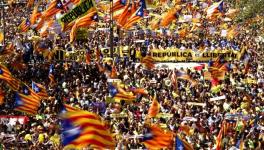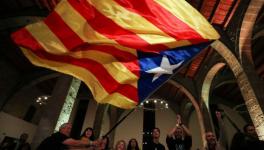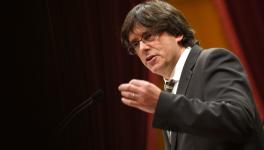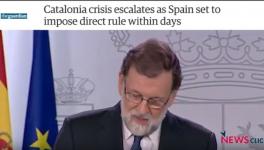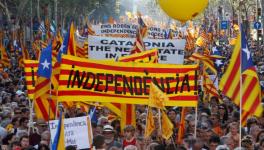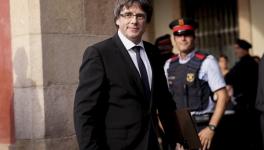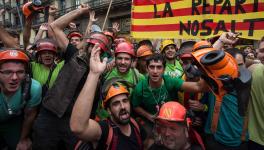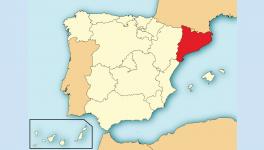Across Catalonia Thousands Protest the Detention of Catalonian Leader Carles Puigdemont
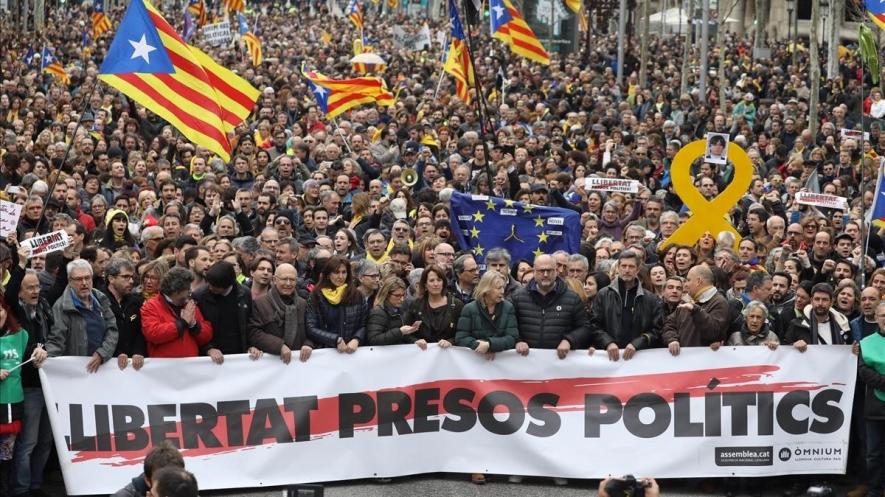
Barcelona 25 03 2018 Mobilizaction against the detention of Puigdemont and for the political prisoners. Photo Credit: Robert Ramos
On Sunday, German authorities announced the detention of exiled Catalan leader, Carles Puigdemont, of the Catalan European Democratic Party, while he was travelling back from Finland to his residence in Belgium. His arrest came two days after the Spanish Supreme Court reactivated a European arrest warrant for the leader, as well as for several other separatist leaders, on charges of rebellion. His arrest sparked protests across Catalonia, which the police responded to with heavy violence and detained nine people.
What happened with Catalan independence?
The latest arrest of Puigdemont and the issuing of arrest warrants for other Catalan leaders is a continuation of the repression by central Spanish state, lead by Prime Minister Mariano Rajoy, against the Catalan independence movement. This is of course a historic, centuries-old repression with deep roots, so for now we will focus here on the events of the past year.
Once the Pro-independence coalition government was formed in January 2016, they vowed to hold a referendum on separation from the central Spanish state. Finally it was decided to hold the referendum in October 2017, despite strong objections by Rajoy’s government.
In mid-September, Rajoy travelled to Catalonia to address the Catalan members of his right-wing party Partido Popular (ironically, People’s Party) where he reaffirmed his rejection of the referendum and thanked the members of his party for being loyal to the Spanish state. The central Spanish government also resorted to a more heavy handed repression in the week leading up to the election, confiscating fliers, printers and even closing polling stations.
Despite their best efforts to suppress the vote, on October 1, Catalonians went en-masse to the polls to vote for their independence. This overwhelming display of support was met by heavy police repression at the hands of the National Police and Civil Guard at the polling stations and on the streets. The Emergency Medical System reported that around 900 people were injured across Catalonia by police repression. Nevertheless, the independence vote won with a 90% and Rajoy declared that no referendum happened.
-Video of an old woman injured at a voting station
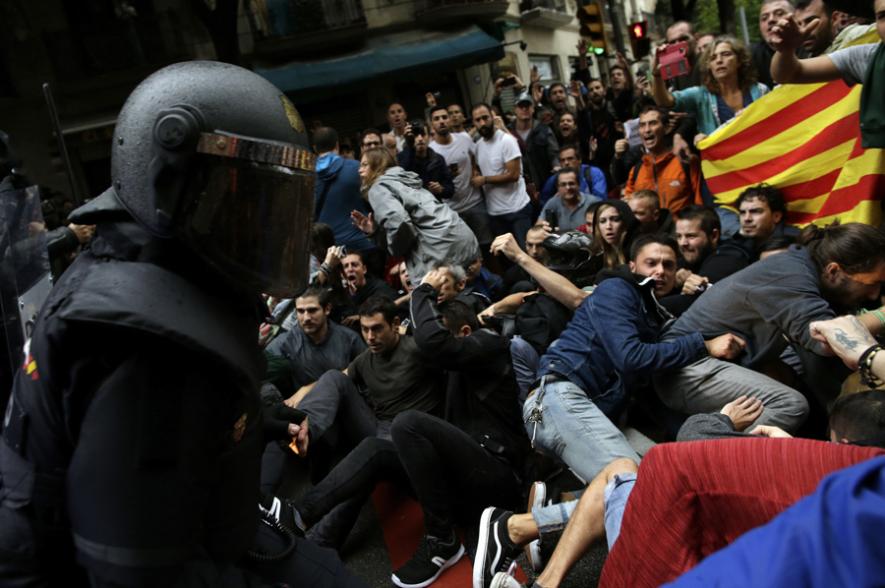
Following this vote, there were many days of uncertainty and confusion over whether or not independence would be or was declared. There were massive mobilizations in the streets in support of independence, while politicians from the Central Spanish Government urged Catalonian politicians to abandon the fight for independence. Rajoy, meanwhile, threatened to implement Article 155 of the constitution which would suspend autonomy and authorize a direct intervention against the independent Catalan government. On October 16, two Catalan leaders, Jordi Sánchez and Jordi Cuixart from prominent pro-independence organizations, were arrested and jailed on charges of sedition.
Finally on October 27, Catalan Parliament approved a declaration of independence. Article 155 was authorized immediately by the Senate. Rajoy announced the suspension of Puigdemont and his government from the office, and dissolved the regional parliament, calling for elections for December 21.
On October 30, Puigdemont and other members of his government were charged with rebellion, sedition and misuse of public funds for carrying out the independence process – charges which carry heavy prison sentences. Puigdemont and four others subsequently fled to Brussels, where they have remained in exile, citing that they would not stay in the Spanish state unless they were guaranteed a fair trial. Eight council members of the Government of Catalonia were put in preventative prison for the same charges.
On December 21, the regional elections ordered by Rajoy as a result of Article 155 were held with around 79% voter turnout. Much to the dismay of Rajoy, the pro-independence parties maintained their majority in the Parliament, and several incarcerated and exiled leaders were elected. Unfortunately, in these elections the Parliament has been unable to elect a new President as the former President Puigdemont is in exile, and Jordi Sánchez, another candidate from Catalan National Assembly party, who has been in prison since October, was forced to withdraw his candidacy. Last week, after Parliament failed to agree on Jordi Turull as Puigdemont’s replacement, he was also arrested and put in jail.
If Catalan deputies are unable to agree on a President before May 22, they will have to hold elections again.
Protests and repression
Following the arrest of Puigdemont in Germany, thousands of people across Catalonia mobilized against the continuing repression of Catalan leaders and the independence movement, demanding the release of political prisoners. They also denounced the European complicity, and in this case specifically, the German complicity with the Spanish State in this repression. In Barcelona, some 55,000 people concentrated in front of the German Consulate, while in the city of Girona – Puigdemont’s hometown – it was reported that at least 10,000 took to streets. On social media people are using the hashtag #PrimaveraCatalana or Catalan Spring.
In response to these massive mobilizations, the police unleashed their all too familiar tactics of indiscriminate brutality against protesters injuring dozens.
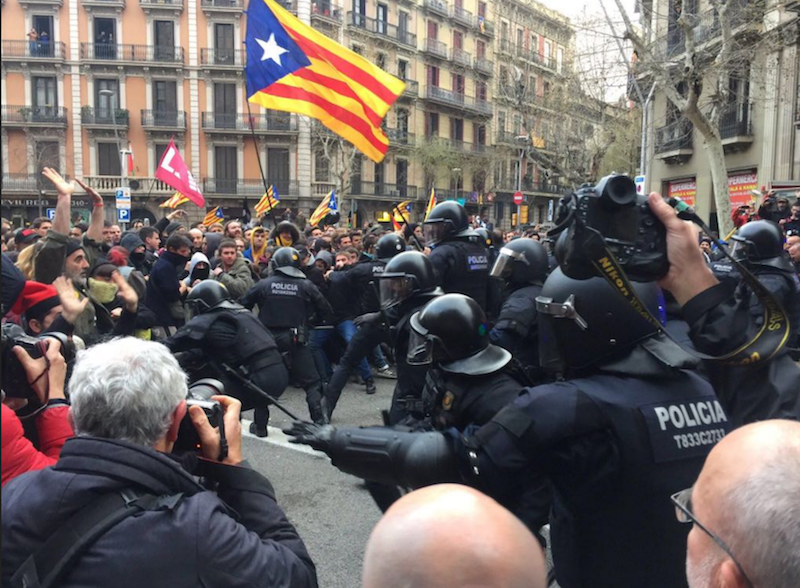
The next few weeks in Catalonia will be key. The Spanish state is intent on crushing their hopes of independence at whatever cost. But even in the face of State repression, persecution and the systematic loss of their leadership, the Catalan people show that they will not back down and continue to defend their right to independence with even more fervor.
Get the latest reports & analysis with people's perspective on Protests, movements & deep analytical videos, discussions of the current affairs in your Telegram app. Subscribe to NewsClick's Telegram channel & get Real-Time updates on stories, as they get published on our website.










